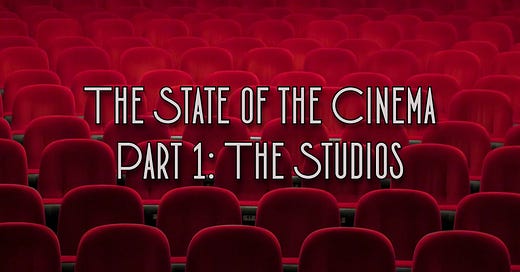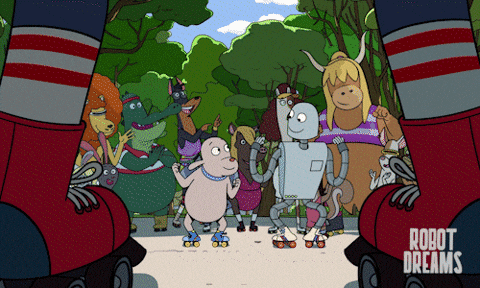I recently did a podcast with my digital friend and fellow critic, Rachel, over at Rachel’s Reviews, and we talked about some of the big blockbusters of this year that left us both disappointed. Movies like Furiosa, A Quiet Place: Day One, Ghostbusters: Frozen Empire, and others that haven’t quite worked. Even if they weren’t bad, a lot of movies have failed to bring in the box office that was expected, leaving lots of studio execs flailing, trying to figure out how to create revenue. We had a fun time talking about this, and I encourage you to check out the conversation.
But since that conversation, I’ve been thinking a lot about the common complaint that there are “no original movies anymore” and how that is hurting the box office. And because there will never be enough takes about this out there, I’m going to add my thoughts to it.
The main thesis of this essay is that what we need is a lot more courage. And that courage is going to be required of all of us.
Studio Courage:
The truth is, the movie-going public is going to be finicky. I looked at the highest-grossing films since 2020, and they are Inside Out 2, Barbie, Top Gun: Maverick, Spider-Man: No Way Home, and Bad Boys for Life. Of those movies, only one was not a sequel, and even it was based on an incredibly popular piece of IP. The two movies that have grossed over a billion worldwide this year are Inside Out 2 and Deadpool & Wolverine. So clearly, people are on board with going to see movies that are big blockbusters built on popular franchises.
But I also want to look at the critical response to those movies. Inside Out 2 has a 91% critical RT score. Barbie has an 88% RT score. Top Gun: Maverick is at 96%. No Way Home is at 93%. And Bad Boys for Life is at 75%. Every single one of these movies that were commercially successful was also critically successful. For all the talk about how “the critics don’t know anything” (an essay for another day), audiences and critics have agreed about the biggest films over the past five years.
Trust The Artists
So, my first suggestion to studios is to have the courage to put their budgets behind stories and effects that are done well and trust the people you hire to do their jobs. Constant reshoots, edits, studio interference, crunch for animators, and general fuckery are getting in the way of writers, directors, animators, and actors actually putting together films that are something that critics and audiences are able to enjoy. Trust that movie-goers will resonate with the story as written rather than trying to appeal to so many people that it ceases to appeal to anyone.
I am a firm believer that the more specific a story, the more it connects with broad audiences. We saw that with the success of Everything Everywhere All At Once. Despite it being a movie that is very specific to the experiences of Chinese immigrant families with queer kids, it hit on themes that are relevant to a much wider audience. If studios want to reach more people, they would benefit from telling smaller stories. And in order to do that, they need to trust the artists they have hired.
Salary Caps
I also think that studios need to have the courage to cap the salaries of The Big Stars. The day of the movie star really does appear to be over. There’s no reason why people shouldn’t show up in droves to a movie starring Emily Blunt and Ryan Gosling, but they did not despite the stars being paid $10 million and $12 million, respectively. Harrison Ford wasn’t able to save a new Indiana Jones movie, but he sure was paid $25 million.
I’m not saying that we should not pay actors. I know that the work is sporadic, time-consuming, grueling, and provides value to our lives. But when a few famouses account for a not small percentage of the whole budget, something has to change. If we ever reach a point where a name drives movie attendance again, then maybe we can rethink that, but right now, that’s just not the case, and salaries need to be adjusted accordingly.
Distribute Smaller Films
Finally, large studios need to be courageous about acquiring some smaller films. I’m so grateful for studios like IFCFilms, A24, NEON, and Magnolia that put money behind films that could otherwise languish in the film festival circuit. But the truth is, they still can’t get movies into tons of theaters. My local theater is fantastic about bringing in smaller films, but it was unable to get A24 titles like I Saw the TV Glow, Sing Sing, and Tuesday. Despite my certainty that Robot Dreams would be a massive hit, it has only had a limited release.
But what if Sony or Warner Bros or Universal were able to put their financial heft behind advertising for some of those movies? I believe that there is a hunger for films outside of the mainstream, and I would love to see some larger studios take a chance on smaller films. Granted, this isn’t until they have accomplished step one in all of this, but advertising and building buzz is a real thing, and smaller studios just don’t have the money to promote their films as well.
I think if studios were to show more courage by allowing artists to do their art, recognizing the changing role of celebrities in films, and picking up some smaller, riskier films, they could positively impact the overall state of filmmaking.
I recognize that these are issues that we have no real control over. So tomorrow I am going to share some of my thoughts about how we as film-goers can make the movie-going experience better.
I also want to remind you that I’m running a sale right now on paid subscriptions. I paywall almost nothing on this Substack (largely because of what I’m writing about tomorrow), but it all takes time and your support allows me to focus on this. If you sign up before the end of the month, you will get 20% off of your subscription forever. If you appreciate what I do here, please consider upgrading to a paid subscription. And if you can’t afford that (which I fully understand!), please consider sharing this publication with other movie-loving folks in your life.









This is a very good analysis Alise. To your point about distributing smaller films, I do wonder if theaters are more apt to book an indie horror movie lately than a non-horror indie because it's perceived that horror still has a built in theatrical audience. We've had some great horror movies this year, but they seem to be crowding out non-horror indies. I'm still stunned that SING SING never played here, and JANET PLANET got like one show a day for one week at my local theater.